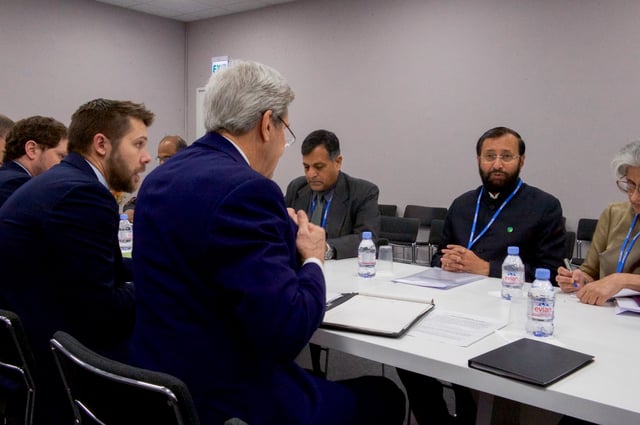Ministry of Environment, Forest and Climate Change

Ministry of Environment, Forest and Climate Change

 Prakash Javadekar, the current Minister of Environment, Forest and Climate Change | |
| Agency overview | |
|---|---|
| Formed | 1985 (1985) |
| Jurisdiction | Government of India |
| Headquarters | Indira Paryavaran Bhavan, Jorbagh Road, New Delhi[1] |
| Annual budget | ₹2,675.42 crore(US$390 million) (2018-19 est.)[2] |
| Ministers responsible |
|
| Agency executives |
|
| Website | www.moef.nic.in [10] |
The Ministry of Environment, Forest and Climate Change (MoEFCC) is an Indian government ministry. The ministry portfolio is currently held by Prakash Javadekar, Union Minister of Environment, Forest and Climate Change.[3]
The ministry is responsible for planning, promoting, coordinating, and overseeing the implementation of environmental and forestry programmes in the country. The main activities undertaken by the ministry include conservation and survey of the flora of India and fauna of India, forests and other wilderness areas; prevention and control of pollution; afforestation, and land degradation mitigation. It is responsible for the administration of the national parks of India.
The Ministry of Environment, Forest and Climate Change is the cadre controlling authority of the Indian Forest Service (IFS), one of the three All India Services.
 Prakash Javadekar, the current Minister of Environment, Forest and Climate Change | |
| Agency overview | |
|---|---|
| Formed | 1985 (1985) |
| Jurisdiction | Government of India |
| Headquarters | Indira Paryavaran Bhavan, Jorbagh Road, New Delhi[1] |
| Annual budget | ₹2,675.42 crore(US$390 million) (2018-19 est.)[2] |
| Ministers responsible |
|
| Agency executives |
|
| Website | www.moef.nic.in [10] |
History
Environmental debates were first introduced into the national political agenda during Indira Gandhi's first term as Prime Minister of India. The 4th Five-Year Plan (1969–74), for example, proclaimed "harmonious development [...] on the basis of a comprehensive appraisal of environmental issues." In 1976 (during the Emergency) Gandhi added Article 48A to the constitution stating that: "The State shall endeavour to protect and improve the environment and to safeguard the forests and wildlife of the country." The same decree transferred wildlife and forests from state list to concurrent list of the constitution, thus giving the central government the power to overrule state decisions on that matter. Such political and constitutional changes prepared the groundwork for the creation of a federal Department of Environment in 1980, turned into the Ministry of Environment and Forests in 1985.[4] Although tackling climate change was already a responsibility of the ministry, its priority was raised when in May 2014 the ministry was renamed to the current title of Ministry of Environment, Forest and Climate Change.[5]
Organisation
Indian Forest Service (IFS)
Authorities Central Zoo Authority of India, New Delhi National Biodiversity Authority, Chennai National Tiger Conservation Authority, New Delhi
Subordinate offices Andaman & Nicobar Islands Forest and Plantation Development Corporation (Public Sector Undertaking) Animal Welfare Board of India , Chennai Botanical Survey of India (BSI), Kolkata Central Pollution Control Board Directorate of Forest Education (DFE), Dehradun Forest Survey of India (FSI), Dehradun Indira Gandhi National Forest Academy (IGNFA), Dehradun National Afforestation and Eco-Development Board National Board of Wildlife National Institute of Animal Welfare National Museum of Natural History (NMNH), New Delhi National Zoological Park (NZP), New Delhi Zoological Survey of India (ZSI), Kolkata
Centres of excellence Centre for Environment Education, Ahmedabad C. P. R. Environmental Education Centre, Chennai Centre for Animals and Environment, Bangalore Centre of Excellence in Environmental Economics, Chennai Foundation for Revitalisation of Local Health Traditions, Bangalore Centre for Ecological Sciences, Bangalore Centre for Environmental Management of Degraded Ecosystem, Delhi Centre for Mining Environment, Dhanbad Sálim Ali Centre for Ornithology and Natural History (SACON), Coimbatore Tropical Botanic Garden and Research Institute,[6] Thiruvananthapuram
Autonomous institutions G. B.Pant Institute of Himalayan Environment and Development, Almora Indian Institute of Forest Management, Bhopal Indian Plywood Industries Research and Training Institute, Bengaluru Indian Institute of Ecology and Environment, New Delhi Indian Council of Forestry Research and Education (ICFRE), Dehradun Wildlife Institute of India (WII[7]), Dehradun
Ministers

Javadekar meeting with US Secretary of State John Kerry at COP21 in Paris.
| Period | Minister |
|---|---|
| 2009–2011 | Jairam Ramesh |
| 2011–2013 | Jayanthi Natarajan |
| 2013–2014 | Veerappa Moily |
| 2014–2016 | Prakash Javadekar |
| 2016–2017 | Anil Madhav Dave |
| 2017- 24 May 2019 | Dr. Harsh Vardhan[3] |
| 31 May 2019 | Prakash Javadekar |
Ministers of State
Mahesh Sharma (3 September 2017 – 24 May 2019)
Babul Supriyo (31 May 2019 - Incumbent)
See also
Department of Environment and Forests (Tamil Nadu)
Van Vigyan Kendra (VVK) Forest Science Centres